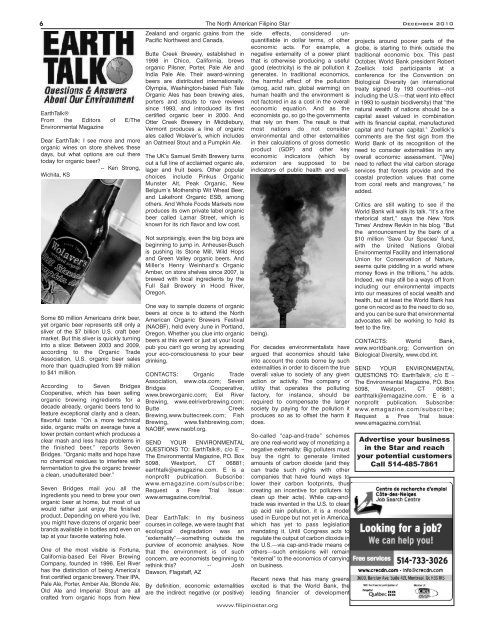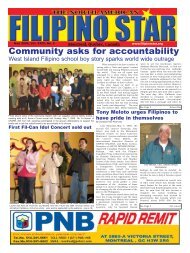Filipino Star - December 2010 Edition
Filipino Star - December 2010 Edition
Filipino Star - December 2010 Edition
Create successful ePaper yourself
Turn your PDF publications into a flip-book with our unique Google optimized e-Paper software.
6<br />
EarthTalk®<br />
From the Editors of E/The<br />
Environmental Magazine<br />
Dear EarthTalk: I see more and more<br />
organic wines on store shelves these<br />
days, but what options are out there<br />
today for organic beer?<br />
-- Ken Strong,<br />
Wichita, KS<br />
Some 80 million Americans drink beer,<br />
yet organic beer represents still only a<br />
sliver of the $7 billion U.S. craft beer<br />
market. But this sliver is quickly turning<br />
into a slice: Between 2003 and 2009,<br />
according to the Organic Trade<br />
Association, U.S. organic beer sales<br />
more than quadrupled from $9 million<br />
to $41 million.<br />
According to Seven Bridges<br />
Cooperative, which has been selling<br />
organic brewing ingredients for a<br />
decade already, organic beers tend to<br />
feature exceptional clarity and a clean,<br />
flavorful taste. “On a more technical<br />
side, organic malts on average have a<br />
lower protein content which produces a<br />
clear mash and less haze problems in<br />
the finished beer,” reports Seven<br />
Bridges. “Organic malts and hops have<br />
no chemical residues to interfere with<br />
fermentation to give the organic brewer<br />
a clean, unadulterated beer.”<br />
Seven Bridges mail you all the<br />
ingredients you need to brew your own<br />
organic beer at home, but most of us<br />
would rather just enjoy the finished<br />
product. Depending on where you live,<br />
you might have dozens of organic beer<br />
brands available in bottles and even on<br />
tap at your favorite watering hole.<br />
One of the most visible is Fortuna,<br />
California-based Eel River Brewing<br />
Company, founded in 1996. Eel River<br />
has the distinction of being America’s<br />
first certified organic brewery. Their IPA,<br />
Pale Ale, Porter, Amber Ale, Blonde Ale,<br />
Old Ale and Imperial Stout are all<br />
crafted from organic hops from New<br />
Zealand and organic grains from the<br />
Pacific Northwest and Canada.<br />
Butte Creek Brewery, established in<br />
1998 in Chico, California, brews<br />
organic Pilsner, Porter, Pale Ale and<br />
India Pale Ale. Their award-winning<br />
beers are distributed internationally.<br />
Olympia, Washington-based Fish Tale<br />
Organic Ales has been brewing ales,<br />
porters and stouts to rave reviews<br />
since 1993, and introduced its first<br />
certified organic beer in 2000. And<br />
Otter Creek Brewery in Middlebury,<br />
Vermont produces a line of organic<br />
ales called Wolaver’s, which includes<br />
an Oatmeal Stout and a Pumpkin Ale.<br />
The UK’s Samuel Smith Brewery turns<br />
out a full line of acclaimed organic ale,<br />
lager and fruit beers. Other popular<br />
choices include Pinkus Organic<br />
Munster Alt, Peak Organic, New<br />
Belgium’s Mothership Wit Wheat Beer,<br />
and Lakefront Organic ESB, among<br />
others. And Whole Foods Markets now<br />
produces its own private label organic<br />
beer called Lamar Street, which is<br />
known for its rich flavor and low cost.<br />
Not surprisingly, even the big boys are<br />
beginning to jump in. Anheuser-Busch<br />
is pushing its Stone Mill, Wild Hops<br />
and Green Valley organic beers. And<br />
Miller’s Henry Weinhard’s Organic<br />
Amber, on store shelves since 2007, is<br />
brewed with local ingredients by the<br />
Full Sail Brewery in Hood River,<br />
Oregon.<br />
One way to sample dozens of organic<br />
beers at once is to attend the North<br />
American Organic Brewers Festival<br />
(NAOBF), held every June in Portland,<br />
Oregon. Whether you clue into organic<br />
beers at this event or just at your local<br />
pub you can't go wrong by spreading<br />
your eco-consciousness to your beer<br />
drinking.<br />
CONTACTS: Organic Trade<br />
Association, www.ota.com; Seven<br />
Bridges Cooperative,<br />
www.breworganic.com; Eel River<br />
Brewing, www.eelriverbrewing.com;<br />
Butte Creek<br />
Brewing,www.buttecreek.com; Fish<br />
Brewing, www.fishbrewing.com;<br />
NAOBF, www.naobf.org.<br />
SEND YOUR ENVIRONMENTAL<br />
QUESTIONS TO: EarthTalk®, c/o E –<br />
The Environmental Magazine, P.O. Box<br />
5098, Westport, CT 06881;<br />
earthtalk@emagazine.com. E is a<br />
nonprofit publication. Subscribe:<br />
www.emagazine.com/subscribe;<br />
Request a Free Trial Issue:<br />
www.emagazine.com/trial.<br />
Dear EarthTalk: In my business<br />
courses in college, we were taught that<br />
ecological degradation was an<br />
“externality”—something outside the<br />
purview of economic analyses. Now<br />
that the environment is of such<br />
concern, are economists beginning to<br />
rethink this? -- Josh<br />
Dawson, Flagstaff, AZ<br />
By definition, economic externalities<br />
are the indirect negative (or positive)<br />
The North American <strong>Filipino</strong> <strong>Star</strong><br />
www.filipinostar.org<br />
side effects, considered unquantifiable<br />
in dollar terms, of other<br />
economic acts. For example, a<br />
negative externality of a power plant<br />
that is otherwise producing a useful<br />
good (electricity) is the air pollution it<br />
generates. In traditional economics,<br />
the harmful effect of the pollution<br />
(smog, acid rain, global warming) on<br />
human health and the environment is<br />
not factored in as a cost in the overall<br />
economic equation. And as the<br />
economists go, so go the governments<br />
that rely on them. The result is that<br />
most nations do not consider<br />
environmental and other externalities<br />
in their calculations of gross domestic<br />
product (GDP) and other key<br />
economic indicators (which by<br />
extension are supposed to be<br />
indicators of public health and well-<br />
being).<br />
For decades environmentalists have<br />
argued that economics should take<br />
into account the costs borne by such<br />
externalities in order to discern the true<br />
overall value to society of any given<br />
action or activity. The company or<br />
utility that operates the polluting<br />
factory, for instance, should be<br />
required to compensate the larger<br />
society by paying for the pollution it<br />
produces so as to offset the harm it<br />
does.<br />
So-called “cap-and-trade” schemes<br />
are one real-world way of monetizing a<br />
negative externality: Big polluters must<br />
buy the right to generate limited<br />
amounts of carbon dioxide (and they<br />
can trade such rights with other<br />
companies that have found ways to<br />
lower their carbon footprints, thus<br />
creating an incentive for polluters to<br />
clean up their acts). While cap-andtrade<br />
was invented in the U.S. to clean<br />
up acid rain pollution, it is a model<br />
used in Europe but not yet in America,<br />
which has yet to pass legislation<br />
mandating it. Until Congress acts to<br />
regulate the output of carbon dioxide in<br />
the U.S.—via cap-and-trade means or<br />
others—such emissions will remain<br />
“external” to the economics of carrying<br />
on business.<br />
Recent news that has many greens<br />
excited is that the World Bank, the<br />
leading financier of development<br />
<strong>December</strong> <strong>2010</strong><br />
projects around poorer parts of the<br />
globe, is starting to think outside the<br />
traditional economic box. This past<br />
October, World Bank president Robert<br />
Zoellick told participants at a<br />
conference for the Convention on<br />
Biological Diversity (an international<br />
treaty signed by 193 countries—not<br />
including the U.S.—that went into effect<br />
in 1993 to sustain biodiversity) that “the<br />
natural wealth of nations should be a<br />
capital asset valued in combination<br />
with its financial capital, manufactured<br />
capital and human capital.” Zoellick’s<br />
comments are the first sign from the<br />
World Bank of its recognition of the<br />
need to consider externalities in any<br />
overall economic assessment. “[We]<br />
need to reflect the vital carbon storage<br />
services that forests provide and the<br />
coastal protection values that come<br />
from coral reefs and mangroves,” he<br />
added.<br />
Critics are still waiting to see if the<br />
World Bank will walk its talk. “It’s a fine<br />
rhetorical start,” says the New York<br />
Times’ Andrew Revkin in his blog. “But<br />
the announcement by the bank of a<br />
$10 million ‘Save Our Species’ fund,<br />
with the United Nations Global<br />
Environmental Facility and International<br />
Union for Conservation of Nature,<br />
seems quite piddling in a world where<br />
money flows in the trillions,” he adds.<br />
Indeed, we may still be a ways off from<br />
including our environmental impacts<br />
into our measures of social wealth and<br />
health, but at least the World Bank has<br />
gone on record as to the need to do so,<br />
and you can be sure that environmental<br />
advocates will be working to hold its<br />
feet to the fire.<br />
CONTACTS: World Bank,<br />
www.worldbank.org; Convention on<br />
Biological Diversity, www.cbd.int.<br />
SEND YOUR ENVIRONMENTAL<br />
QUESTIONS TO: EarthTalk®, c/o E –<br />
The Environmental Magazine, P.O. Box<br />
5098, Westport, CT 06881;<br />
earthtalk@emagazine.com. E is a<br />
nonprofit publication. Subscribe:<br />
www.emagazine.com/subscribe;<br />
Request a Free Trial Issue:<br />
www.emagazine.com/trial.<br />
Advertise your business<br />
in the <strong>Star</strong> and reach<br />
your potential customers<br />
Call 514-485-7861















